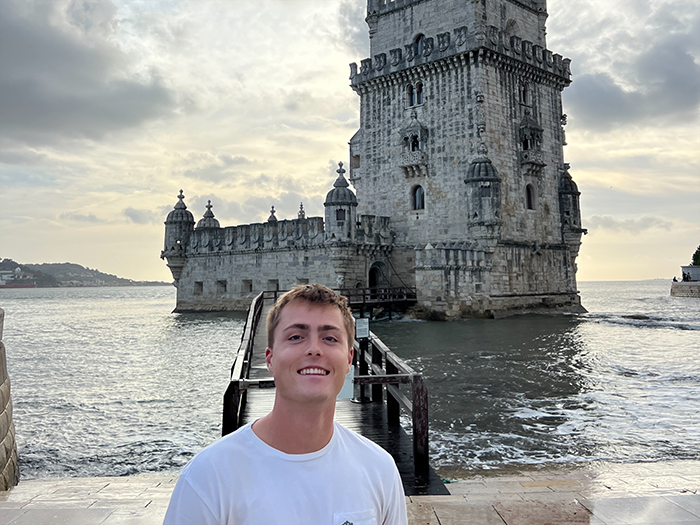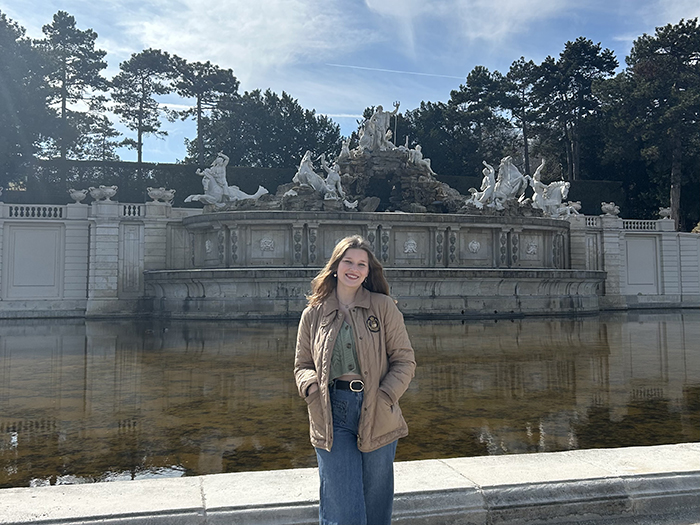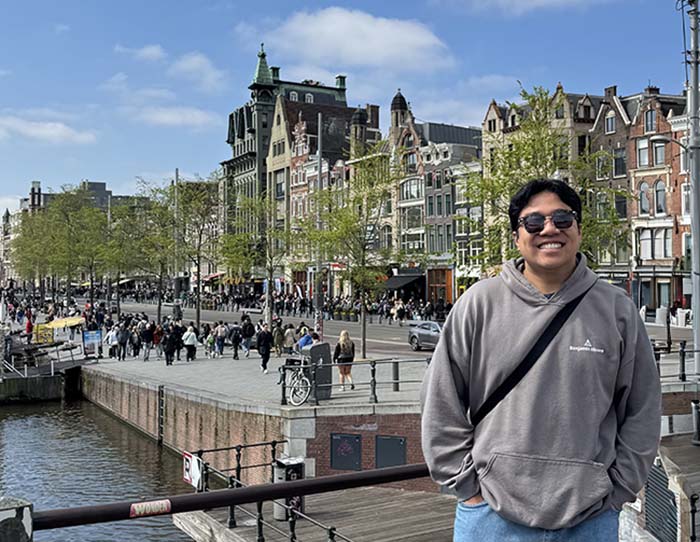Global Study and Engagement
View MenuDickinson in BOLOGNA
K. ROBERT NILSSON CENTER FOR EUROPEAN STUDIES
Founded in 1964, the K. Robert Nilsson Center for European Studies is Dickinson College’s oldest study abroad program.
The Dickinson Center hosts two academic programs: the European Studies Program and the Italian Studies Program (scroll down to find out more).
The Center offers courses that have an emphasis on Social sciences and Italian language and culture. Students from both programs may also choose to attend courses at the University of Bologna (offered in English or Italian) or at the Johns Hopkins University School of Advanced International Studies in Bologna (pending approval).
Contact Info
-
Phone
- +39 051 224451
-
Fax
- ---
-
Social Media
-
Location
- via Marsala 2, 40126, Bologna, Italy Mailing Address
Academics
TO BE UPDATED (FALL 2025)
Scholarships
Marco Biagi Scholarship
The Biagi Scholarship was established to honor Marco Biagi, who was a professor, legal counsel, and good friend of Dickinson’s Bologna program. Biagi, a native of Bologna, was a University professor and consultant to the Italian Ministry of Labour. For over twenty years, he taught for the the Dickinson Center in Bologna as Adjunct Professor of European Labour Law and Politics and Comparative Industrial Relations. He was also a member of the Academic Council at the Johns Hopkins University of Bologna Center. The scholarship in his name was eastablished in 2003, a year after Biagi's tragic passing.
The scholarship is assigned to a student who best exemplifies the spirit and purpose of the Bologna Program - not only in terms of their academic performance, but also taking into account the extent to which the student takes advantage of the full range of opportunities available to them, demonstrating commitment to global engagement, and the positive contributions that they make to the program.
Guccini Scholarship
Francesco Guccini is a well-known Italian singer-song writer and considered one of the most important cantauori. He is also a writer, an actor, soundtrack composer, lexicographer and dialectologist. His lyrics in his song has been praised for their poetic and literary value and have been used as an example of modern poetry. Guccini was born in 1940 in Modena, Italy. In 1960 he moved to Bologna where Guccini studied at the University of Bologna. From 1965 to 1985, Guccini taught Italian at Dickinson College in Bologna, leaving a long-lasting impact on his students.
Volunteering and Cultural Exchange Opportunities
Italian host family dinners
Students in the Bologna Program can sign up to have a weekly meal with an Italian host family. The so-called “host family dinner” program was first offered in 1996, made possible thanks to the wide network of connections that former Associate Director Clarissa Pagni had in Bologna. Since then, this program has always been one of the most popular inter-cultural activities among the students.
This is a free cultural and language exchange for both parts, as the Italian families are exposed to the English language and have the opportunity to get to know a new culture, while the students get to experience the Italian culture, language, and lifestyle (and cuisine!) in an authentic environment.
Many students develop a long-term relationship with their host families and find this one of the most rewarding experiences of their time abroad.
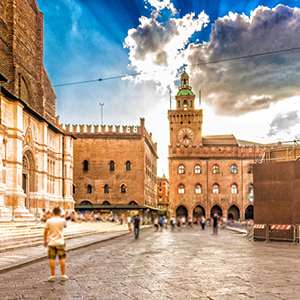
Dickinson in Italy: European Studies
Since the 1960s, the European Studies program has empowered students to understand Italian and European cultures and societies through the social sciences and humanities. Coursework at the Nilsson Center in various disciplines makes use of place-based educational opportunities to enhance learning. Students may also benefit from the increasing number of courses offered in English at the University of Bologna, as well as the resources of Johns Hopkins University SAIS. Program faculty and staff use activities and excursions to guide students to deeper engagement with Italy.
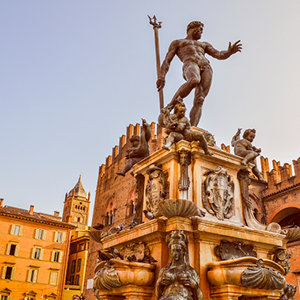
Dickinson in Italy: Italian Studies
The Italian Studies Programs offers a curriculum of courses all in Italian ranging from Art History, History of Science, Sustainable Food, Social Activism in Italy etc. Some of these courses include a community engagement component where students volunteer their time in local organizations and conduct reflective thinking about the gains of such experience. At the same time, they may also attend courses at the University of Bologna, courses in English offered at the Dickinson Center or at the Johns Hopkins Graduate Center in Bologna. Students on the Italian Studies program live in apartments with a student from the University of Bologna, travel on program trips (2 per each semester), and explore Italy and Europe independently.
Dickinson College Center: Bologna Staff

Bruno Grazioli, Italian Studies Resident Director
Bruno has studied in Italy and the UK, where he has earned a Bachelor of Arts in English and French, an M.A. in Pedagogy and Promotion of Italian Language and Culture at the University Ca‘ Foscari of Venice, an M.A. and Ph.D. in Italian Studies. He lived for over a decade in the United States, where he was faculty in Italian at a private liberal arts college in the North East and served as academic director for study-abroad programs in Florence (11-12, 14-15). In 2018 Bruno relocated to Italy and helped launch the Italian Studies Program to offer Dickinson students the opportunity to delve into Italian culture and further their knowledge of the language. To this end, he has developed and taught a course on Italian Activism combining traditional instruction in class with volunteering/community engagement work in local organizations. Bruno has faculty status at the college and maintains active collaboration with the Italian Department on campus

Luca Trazzi, European Studies Resident Director
trazzil@dickinson.edu
Luca Trazzi holds degrees in foreign languages, linguistics, and food studies. At Dickinson, he teaches elementary, intermediate, and writing-in-the-discipline (WID) Italian courses and organizes Italian events on campus. As a contributing faculty member to the Food Studies Certificate, he has chaired the program and taught “Introduction to Food Studies,” the certificate's gateway course. He developed a Globally Integrated Course for Intermediate Italian focused on sustainability, urban agriculture, and urban markets in Italy. He led a summer program in Food Studies, titled “Bioregions and Food Cultures of Italy,” in which participants studied local food systems through the holistic concepts of bioregion and terroir. In May 2023, he was the faculty host for an Alumni Global Adventure to discover the flavors of Bologna and Central Italy. He is currently serving as Resident Director for the European Studies Program at the K. Robert Nilsson Center for European Studies in Bologna, Italy.

Ellen Laird, Administrative Director
Ellen earned a Bachelor of Arts degree in English and Italian Studies from Dickinson College, where she also spent her junior year studying abroad in Bologna, Italy. Ellen returned home from that year in Bologna knowing that she would live abroad again. After graduation, she returned to Italy and taught English for a few years before she began working for the Dickinson in Italy program in Bologna. During her time with Dickinson, she has also earned an M.B.A. from the Bologna Business School of the University of Bologna. As Administrative Director of Dickinson in Italy, Ellen manages academic, administrative, and student life aspects of the program in addition to collaborating with colleagues to foster global learning through the curriculum and culturally immersive experience in Bologna.

Elena Giulia Dall'Acqua, Program Associate
A native of Marche region, Elena Giulia holds a Bachelor of Arts in Classics from the University of Macerata, and a Master of Arts in Italian Studies from the University of Bologna. While earning her master's degree, she completed an internship at the Eastern College Consortium (E.C.Co) - a study abroad program in Bologna offered by Vassar College, Wellesley College, and Wesleyan University. During her internship, she developed a strong interest in international education.
Upon completing her master's degree, she began working for the Dickinson Center in Bologna in 2017. In her role as Program Associate, Elena Giulia is responsible for a variety of duties: on-site orientation and support to students in all aspects of daily life in Bologna, student housing, cultural and language exchange opportunities, organization of trips and cultural events, social media management, and other administrative aspects of the Program.

Elisabetta Cunsolo, Faculty (Art History)
Elisabetta Cunsolo began teaching Art History for the Dickinson program in Bologna in 2008. Her courses are mainly focused on Bologna and its art. She often teaches on site to promote discussion in front of the works themselves and to get the students excited about visiting museums and exhibitions. Elisabetta frequently organizes field trips so that students can better understand the richness and variety of Italian culture. Her focus has always been on making Dickinson students develop a deep interest in Italian art, history, and culture, on stimulating their curiosity, and capitalizing on the enthusiasm they always bring to Italy. Since 2013, Elisabetta has also been teaching Art History for the Eastern College Consortium Program (Vassar, Wellesley, Wesleyan) in Bologna.
After graduating in the History of Art with a thesis on the 18th century Venetian art, literature and music, Elisabetta completed a PhD focusing on illustrated medical treatises written by Italian physicians and published between the second half of the 16th century and the first half of the 17th. Her research, published in articles and essays, involves many different areas of study—from history of art and publishing, to history and history of science. At present, Elisabetta's research focuses on the history of art and culture in Bologna in the 15th century, with a focus on the study of local families and palaces of that time.
Elisabetta has also worked as assistant and project manager for the cataloging and digitization projects of the Fototeca Berenson at Villa I Tatti, The Harvard University Center for Italian Renaissance Studies in Florence, Italy, and as specialized consultant of the Acton Photograph Archive Digitization Project at Villa La Pietra, New York University in Florence.
"Art is not merely my job, it is also, and above all, my passion. I think that even the art and culture of the Renaissance which I teach in my courses, and that look so distant from our world, can help us to understand the present more than we might know. What I try to teach my students is not notions of art history, but a way of looking at things, of asking questions about them and understanding their deeper meaning."

Elena Galeotti, Faculty (Italian Language and Culture)
A Bologna native, Professor Galeotti taught Italian in the USA (International Centre for Language Studies - ICLS, 727 15th St. NW, Washington D.C 1991, Casa Italiana, connected to American University, 595 3rd St. NW, Washington D.C.) and at various academic institutions in Bologna (Johns Hopkins University SAIS, since 2001, Dickinson College). Her main interests are cinema, creative writing and theater. In her language classes, Galeotti employs theatrical techniques to make them more effective and engaging, both from the point of view of verbal and non-verbal communication. By building upon written texts and works of literature, she encourages students’ ability to produce creative scripts and speak spontaneously. Elena Galeotti has been working closely with schools on the Bologna territory. In collaboration with the city administration and various local and national organizations (for ex. ANPI – Associazione Nazionale Partigiani d’Italia), she organizes and leads school workshop projects for University and High school students. The Theater Workshop is a place where everyone can express their hidden creative sides thanks to training. The training is based on some theatrical techniques based on verbal communication and creative gestures. Theater training at school must lead each student to new discoveries about their subjectivity in the essential relationship with their friends / classmates. Elena Galeotti has continued working in theater both as an actress/manager and as an independent researcher (she has published on I quaderni del libero Gruppo, Armunia; Tempo senza tempo, in “TEMPO” (seconda parte) pp. 2-5, Castiglioncello Gennaio 2015, Eudaimonìa, in “CATARSI” (seconda parte) pp. 28-31, Castiglioncello Marzo 2015). In 2001, she founded the Compagnia Cantharide in Zola Predosa (Bologna, Italy) with a group of artists. In 2017, she became the manager of the Spazio Binario Auditorium, always in Zola Predosa. In 2019, in collaboration with Drama Teatro in Modena, Galeotti began the D’umanità l’attore project (the Humanity Actor project).
"I love teaching my language and culture. I love spending time with students who share their cultures with me. Each encounter is an exchange, an opportunity to discover new ways of life and broaden our horizons."

Roberto Gamberini, Faculty (Italian Language)
Prof. Gamberini holds an M.A. in Linguistics from the Università La Sapienza di Roma (Italy) and a professional credential for teaching Italian as a second language (DITALS II) from the Università per Stranieri di Siena. He has extensive experience in language teaching and regularly attends professional development courses on issues such as oral proficiency interview (The American Council on the Teaching of Foreign Languages), online tutoring (International House), neurolanguage coaching (Efficient Language Coaching) and accommodating disabilities in language learning (Università per gli Studi di Parma). Prior to joining Dickinson in 2018, he was coordinator of the Italian Language Program and Italian Instructor at the U.S. Embassy in Rome.
-
Global Study and Engagement News All News
-
Department News
-
Global Study and Engagement News
-
All News
-
Department News
